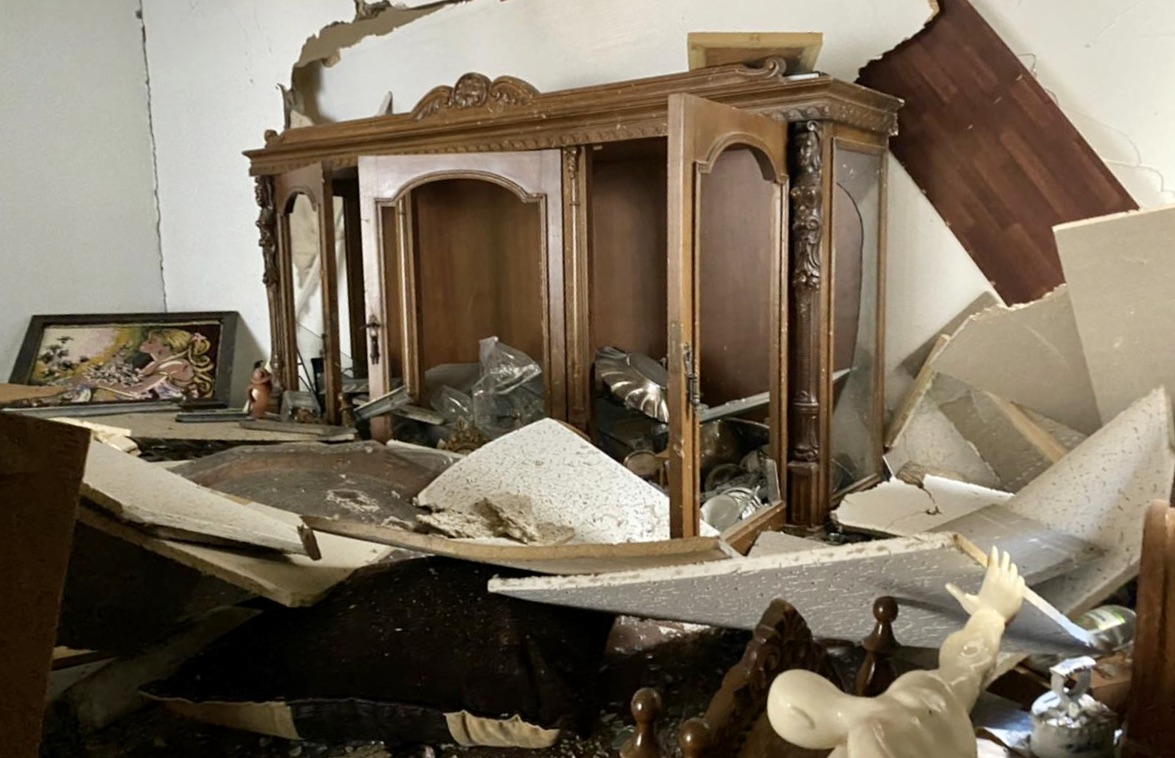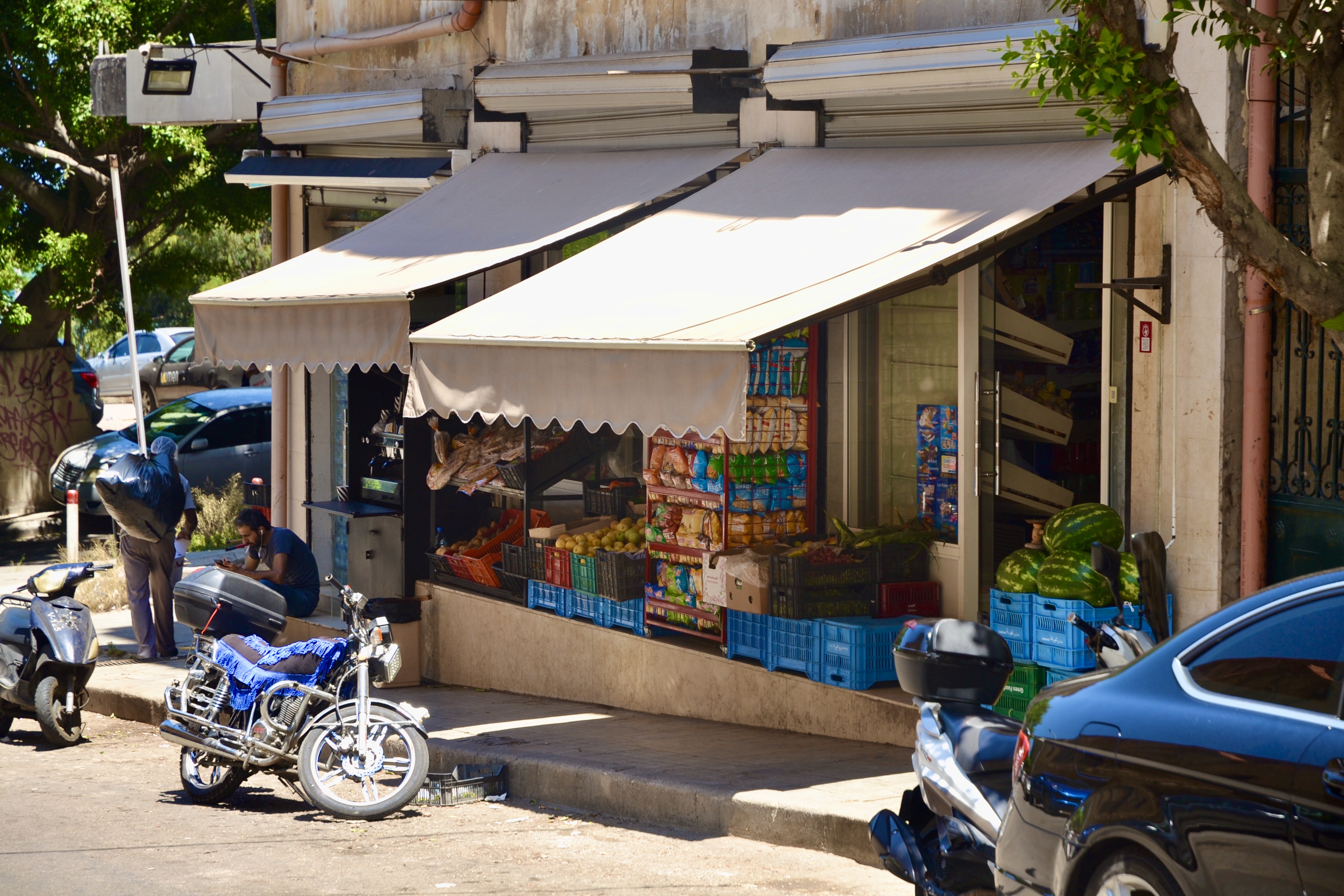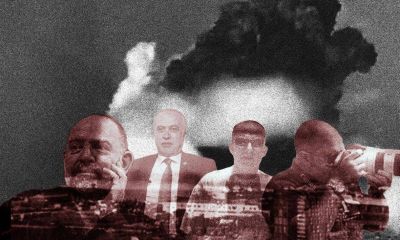
Aline Salloum, 40, standing in the alley of the building she used to live in in Gemmayzeh. (Credit: Yasmina Abou-Haka/L’Orient Today)
The Aug. 4, 2020, Beirut blast was really “the apocalypse and the death of the Lebanon that we once knew,” in the words of Lebanese journalist Dalal Mawad. For many, there will always be a before and after Aug. 4.
Three years have passed and justice continues to elude us, with promised answers falling into the void.
Amid the lingering shadows, a ray of hope emerges. Beirut, renowned for its Art de Vivre, Art de Recevoir ("Art of living, art of entertaining") is slowly starting to regain its colors, with tourists and expats flocking to the city in droves. This revival is nurtured by the efforts of individuals, organizations and NGOs that have come together to support the city.
This year, at L’Orient Today, we have chosen to shed light on the journeys of those who stayed and fought back, each in their own way. In a series of six profiles, we share with you their stories, struggles and aspirations.
On Aug. 4, 2020, Aline Salloum, owner of the Be Well dekken ("market") in Gemmayzeh, sat in her bed on the fourth floor of her shop’s building, video calling with her best friend on what she thought was a normal summer day.
“It was really hot. We had closed the windows. Surprisingly, electricity was supplied, so we turned on the air conditioning,” she recalls.
“My older son comes up from the shop and tells me that there’s a heavy noise of an airplane — 'I think Israel is bombarding us.' I was surprised,” she recounts, the sound of fireworks etched in her memory.
As the noise grew louder, Salloum’s sense of unease heightened. When the blast struck, “my first reaction was to put my hand over my mouth,” she recalls.
“My teeth fell into my hand."
“I looked around. I saw my son. His hand was practically detached from his arm, this was my middle son, Daniel (17). I looked at Ayman, my youngest (10). His face was ripped in the middle.”
Progressively, the severity of Salloum’s own injuries started to show. She repeatedly lost consciousness. Her eldest son, Elia (21), had to continuously urge her to stay awake. “For the third time,” she says, “my son woke me up and said: ‘Don’t you dare lose consciousness, don’t you dare die’.”
 Salloum’s former apartment in Gemmayzeh in the aftermath of the blast. (Credit: Aline Salloum)
Salloum’s former apartment in Gemmayzeh in the aftermath of the blast. (Credit: Aline Salloum)
As she struggled to understand the situation, Salloum found solace in her eldest son’s voice, which gave her enough strength to reassure her other two sons and act pragmatically.
“I told my little son not to be scared and I asked Elia to remove his t-shirt and wrap it around his brother’s face.”
Against all odds, Salloum and her sons managed to descend the stairs and navigate the shattered streets in search of medical assistance. The journey to the nearest hospital —Wardieh Hospital — proved challenging as they heard on their way that the blast had left the medical facility in ruins.
They eventually reached Hotel Dieu on a moped.
Hitting Ground Zero
Lebanon’s already strained economy, compounded by the impact of the blast and the subsequent banking crisis, left Salloum’s family in dire circumstances.
“We no longer had a home, nor a shop, nor a car, nothing,” says Salloum. Between heavy medical bills, living expenses and school tuition fees, she and her husband faced extreme financial pressure.
“I had to pay half of my treatment as the state only covered 50 percent of it,” she recalls.
Two weeks after the blast, and against her husband’s advice, Salloum took it upon herself to visit her destroyed home and shop in Gemmayzeh. When she set eyes on the ruins of her shop, she decided she wanted to go home to Syria, which she had left 26 years ago
“I was going to wake up the next morning and leave.”
But that night, something changed. Salloum woke up and called her husband: “I am not going to leave,” she told him. “I wasn’t going to leave everything, all our work and efforts … No, I wasn’t going to accept that,” she tells L’Orient Today.
Salloum convinced her husband to stay with her, but they sent their sons to Syria to stay with their grandparents until the end of the summer. Salloum pursued her treatment in Lebanon and her husband spearheaded the rebuilding of their market.
Recovery & reconstruction: Finding inner peace
Salloum was badly injured during the blast.
“My arms were completely wrapped, my face and legs were all stitched up and I didn’t have teeth,” she remembers. Yet, despite her injuries, she was “always laughing, always happy.”
“People would look at me and ask: ‘How can you be this happy? How can you be this comfortable?’ I was disfigured. Disfigured in every sense of the term.”
She gestures to her face. “I had stitches from here to here to here …. My hands were full of stitches.”
“I get all my strength from God. I feel that God gave me another chance. I am still alive. I can continue my life. My kids are still alive,” she says. Her desire to get back on her feet shaped her strength. Badly hurt, she “would give strength to others,” while she took her strength from God.
The Salloum family persevered and restored their business to its former capacity. “A lot of people came and helped us both financially and morally. Some [people] we didn’t even know.”
Salloum says NGOs didn’t provide any financial support, but they actively participated in the material reconstruction.
“They would come to rebuild the walls, the ceiling, they would come and put in lights, things as such.”
The collective efforts and unyielding determination have restored the market's former vibrancy. But others were less lucky. Many around them had to shut down their businesses.
“Everything changed in the neighborhood. Life was sucked from here,” Salloum recalls. With many new shops around it, Be Well now stands as a testament to Salloum’s strength and that of her community, but also to her and her husband’s will to stay in Lebanon.
“People really like us here, we have a special reputation around. This environment always gets strength from the fact that Bilal, my husband, is here. ‘There is Bilal’. Whatever they need, there is Bilal. The people who stayed here found it very important that Bilal stayed and didn’t give up.”
Luckily, Bilal, standing outside the shop, was untouched by the explosion and thus took charge of bringing the market back to life. Salloum, however, quit her duties at the shop she had run for 18 years and only returns occasionally.
 Be Well Market in Gemmayzeh has restored its former vibrancy three years after the explosion. (Credit: Yasmina Abou-Haka/L’Orient Today)
Be Well Market in Gemmayzeh has restored its former vibrancy three years after the explosion. (Credit: Yasmina Abou-Haka/L’Orient Today)
“After the explosion, I couldn’t anymore. At some point, no matter what, there are things that you cannot keep doing. Dealing with people, having people say: ‘Ouf, how did it happen?’ I cannot bear it anymore.”
She also said returning to their former apartment was too difficult. She, her husband and her kids moved to a new home in Mansourieh.
“I couldn’t handle being up there anymore.”
‘I didn’t leave. I am still here.’
The Salloums came to Lebanon three decades ago by personal choice. “It is not related to the war in Syria, nor to anything else,” Salloum explains. “All our lives are here in Lebanon. Our kids study here in schools, we work, we pay rent.”
The explosion and the evident deterioration of the country have pushed hundreds of thousands of Lebanese out of the country. “I understand that some people couldn’t stay. I couldn’t stay, but I stayed” asserted Salloum.
“I love Lebanon so much. I love Lebanon as much as I love Syria,” she says. “It is still full of life. Some people are happy. People are still fighting to stay. I don’t think Lebanon dies at all.”
“As much as I want to be happy here, I also want to be sad here. I want to have fun. I want to cry. I want to be mad. I want everything here. … I find a lot of difficulties, and sometimes I ask myself how long can I continue. But as long as I can, I am staying.”
